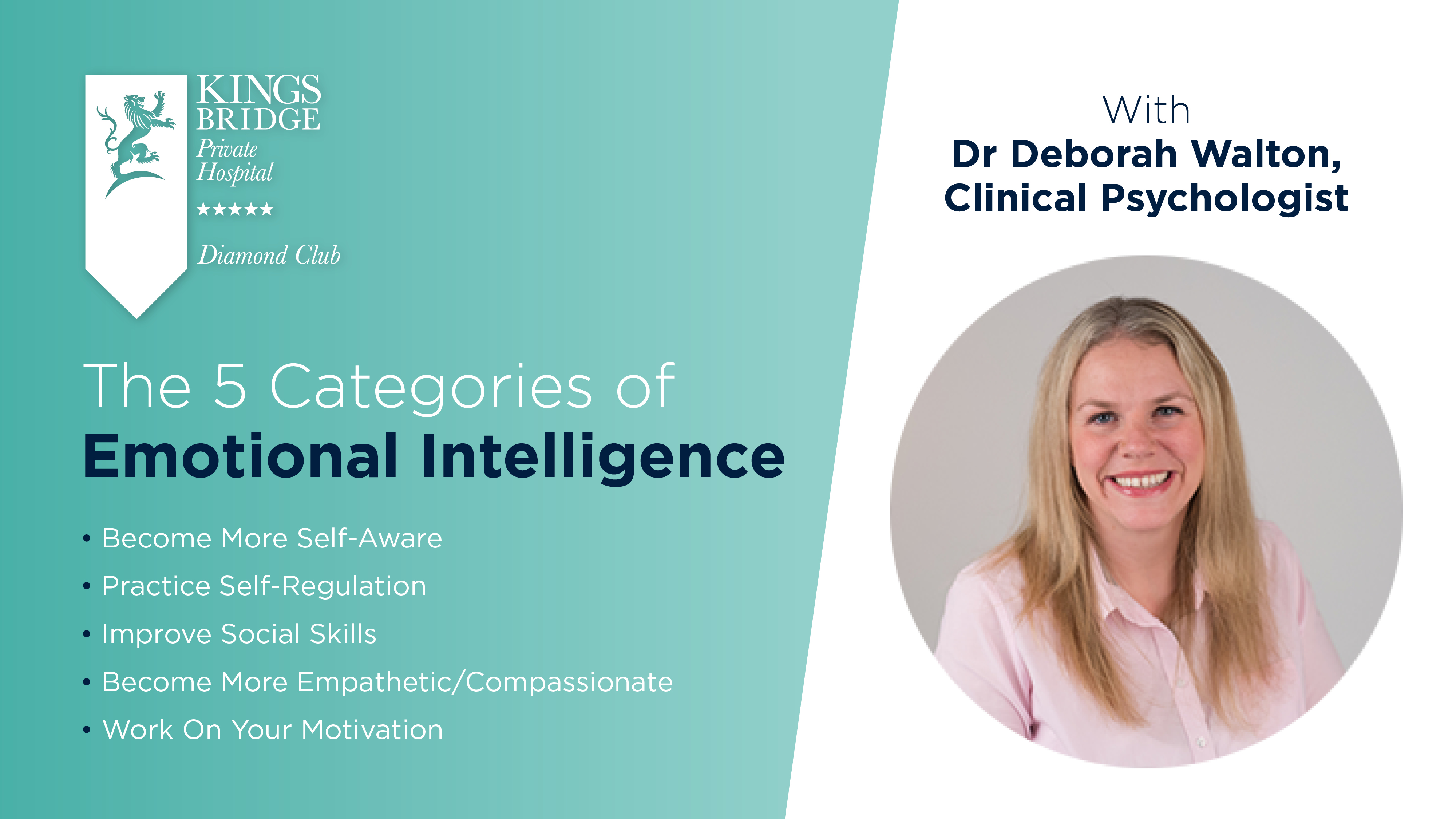Emotional Intelligence In The Workplace With Dr Deborah Walton, Clinical Psychologist
23rd, Aug 2023
Psychological health and wellbeing in the workplace comes down to the way we treat each other and interact while at work. Building emotional intelligence (EQ) can provide multiple benefits especially among those whose roles include managing, supporting or leading employees.
Emotional intelligence, sometimes referred to as EQ ("emotional quotient"), refers to a person's ability to recognise, understand, manage and reason with emotions. Emotional intelligence is described as the ability to manage one's own emotions, as well as the ability to recognise and appropriately respond to the emotional distress of others.
The skills involved in emotional intelligence are self-awareness, self-regulation, motivation, empathy and social skills. Embracing the nuances of human emotion in the workplace can have pragmatic benefits, such as better collaboration among employees along with a happier workplace. We are human beings every day, not just when we leave the office.
The unfortunate trend that has swept western society is the inability to fully understand and tackle human emotions. This trend has spilled into other areas of life - including in the workplace. While emotions are often left at the door when you begin work, this has devastating effects not only on businesses, but also employees (all the way from assistant to CEO).
What are elements of emotional intelligence?
Self-awareness is about understanding yourself: knowing your weaknesses, strengths, drivers, values, and your impact on other people – forces for good intuition, essentially. In practice, this would look like self-confidence and a thirst for constructive criticism. If you might know that tight deadlines bring out the worst in yourself. A self-aware and emotionally intelligent employee would plan their time properly and get the work done well in advance of any deadlines.
Self-management is the ability to control and redirect disruptive impulses and moods. Think of trustworthiness, integrity, and comfort with change. It is not letting your emotions cripple you and instead marshalling your positive emotions. For example, if a team botches a presentation, the leader ought to resist the urge to scream. Instead, they could consider possible reasons for failure, explain the consequences to their team members and explore solutions together.
Motivation is enjoying achievement for its own sake. A passion for the work you do, optimism and energy to improve, are the key hallmarks of an emotionally intelligent and motivated person.
Empathy/Compassion is understanding other people’s emotional makeup. It’s considering others’ feelings, especially when making decisions. Some trademarks of empathy include an ability to develop other people and sensitivity to cross-cultural differences. Imagine a consultant and their team trying to pitch something to a potential foreign client. After the pitch, the client is silent and the team interprets this as disapproval. The consultant, however, senses interest owing to the body language and continues with the meeting and the team gets the job. That is what empathy is.
Finally, Social Skill is building a relationship with others to move them in desired directions. Think influence here.
How to Become More Emotionally Intelligent
It’s clear that we’re all emotionally intelligent but we need to take more time to self-assess and work on our emotions. As with anything, it takes practice but even small steps can make a big difference. Much as you would regularly exercise your biceps or any other muscle for that matter, you need to practice working on your competencies, so that they improve.
Admittedly, when we look at leaders in some of the most successful companies, it’s clear that all of these leaders demonstrate high levels of all the key components of emotional intelligence. It’s important to keep in mind that these are a range of abilities.
For emotional intelligence to be effective, it has to start with yourself. You can’t distill or enhance other people’s well-being, improvement and sense of self without first understanding how you operate on an emotional level.
While emotional skills may come naturally to some people, there are things that anyone can do to help improve their ability to understand and reason with emotions. This can be particularly helpful in the workplace, where relationships and business decisions often rely on the interpersonal understanding, teamwork, and communication.
If you are interested in improving your emotional intelligence skills to benefit your workplace performance, take steps to improve your skills in the five categories of emotional intelligence: Self-awareness, self-regulation, social skills, empathy and motivation.
Become More Self-Aware
- Pay attention to how you are feeling.
- Take stock of emotional strengths and weaknesses.
- Remember that emotions are fleeting.
Practice Self-Regulation
- Find techniques to release workplace stress.
- Keep your cool.
- Think before making decisions.
Improve Social Skills
- Listen to what others have to say.
- Pay attention to nonverbal communication.
- Hone your persuasion skills.
- Avoid office drama.
Become More Empathetic/Compassionate
- See things from the other person's point of view.
- Pay attention to how you respond to others.
Work on Your Motivation
- Focus on what you love about your work.
- Try to maintain a positive attitude.
Emotional intelligence plays an important role not only in well-being but also in your success in the workplace. Fortunately, there are a number of lessons you can take from emotion psychology that will allow you to improve your EQ and foster , businesses are changing, offering extensive and individual work schedules and new services, to ensure people at work are looked after. This includes hiring psychologists, getting to understand your workforce as best as possible and offering useful training. Most certainly has direct result on employee/employer relationships and productivity.
Create an Organisational Culture of Compassion with Pasco Psychology
Pasco Psychology is a Northern Ireland based company which strives to promote the benefits of compassion in the workplace for both employees and organisations as a whole. We aim to support organisations and businesses in the local area to develop a culture of compassion and to incorporate compassion as part of their core values.
If you want assistance to promote emotional intelligence/compassion within your organisation, please see below:
Visit www.wpsclinical.com
Contact hello@wpsclinical.com
Call 07971805666
Article written by Dr Deborah Walton B.A. (Hons.), MSc, Clin.Psy.D., AFBPsS
Clinical Psychologist at Kingsbridge Private Hospital, Belfast
For further information on our Psycology services avaiable, please click here. To book an appointment with Dr Deborah Walton, please contact 028 9066 7878 or by visiting our Online Booking Portal
If you would like to find out more about our Kingsbridge Diamond Club, please email membership@kingsbridgeprivatehospital.com or visit www.kingsbridgediamondclub.com









